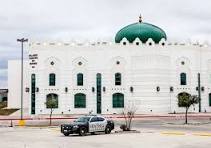By Qamar Bashir
Naturally, as a long-time observer of diaspora dynamics—and having served as Press Attaché in Kuala Lumpur and Press Minister in Paris, while observing the Pakistani community in over 20 countries in both official and private capacities—I’ve always remained deeply attuned to the evolution of Pakistani and broader Muslim communities abroad. What has consistently amazed me—whether in Malaysia, France, Canada, or now the United States—is the inherent resilience and unity within the Pakistani diaspora.
Wherever they go, they organize. They establish cultural centers, host community
festivals, open restaurants, support one another’s businesses, and transform humble
basement gatherings into majestic mosques.
Yet, like every community, they carry both virtues and vices. Backbiting, leg-pulling, and
even complaints to local authorities against fellow Pakistanis are not uncommon. Still,
these shortcomings never overshadow their core strengths. When it comes to culture,
faith, patriotism, supporting the destitute, or observing religious and national events and
celebrations—they come together, they unite, and they build. That cohesion becomes
their identity, their protective shield, and a powerful platform for collective progress.
My recent observations in Michigan echo the same story. I’ve seen how the Muslim
community—Pakistani, Bangladeshi, Indian, and others—have coalesced around grand
mosques, especially the Islamic Center near Rochester Hills. There, thousands gather for
Jummah, Eid, and community events. The complex is not just a religious site; it is a
beacon of togetherness, inclusion, and hope.
However, what compelled me to write today is something far more unprecedented than a
mosque or a cultural center. It is the emergence of an entire Islamic city—not an informal
clustering like Hamtramck, Michigan, but a purpose-built, master-planned city in the
heart of Texas: EPIC City.
Spearheaded by the East Plano Islamic Center, this 400-acre development near Josephine,
Texas, aims to establish a fully integrated community: over 1,000 residential homes, a
mosque, a K–12 school, a college, community centers, retail plazas, gardens, and even
recreational parks. This isn’t a gated religious commune, but an open and inclusive city
inspired by Islamic values of peace, education, hospitality, and coexistence. People of all
faiths and backgrounds are welcome.
And this is what makes the story both inspiring and controversial. The city’s approval by
local authorities was not an accident. It was earned—through the track record of Muslim
communities in Texas, who have demonstrated peaceful coexistence, hardworking ethics,
and civic engagement. The project, backed by Community Capital Partners, reflects the
growing social, political, and economic clout of Muslims in America. Pakistani,
Bangladeshi, Indian, African, Arab—Muslims from all over the world came together in
this vision.
But not everyone welcomed this initiative.Soon after the city’s plans were revealed, an
avalanche of toxic reactions flooded traditional and social media. Right-wing activists
and even top-level politicians—including Governor Greg Abbott and Attorney General
Ken Paxton—began raising alarm bells. They questioned why an “Islamic city” should be
allowed in Texas. They compared it to an alleged imposition of “Sharia law,”
conveniently ignoring the dozens of Christian-based retirement communities and Jewish
settlements that exist across the U.S.
The hypocrisy is glaring. While Muslims aim to build schools, gardens, homes, and
prayer halls, America has for decades exported military bases around the world. This
project is not about exclusion—it is about expression. And yet, the backlash has escalated
into congressional debates and even calls for federal investigations.
Despite this storm of resistance, EPIC City is moving forward—calmly, legally, and
purposefully. Its leaders maintain that it will not be an enclave of isolation but a model of
harmony. And indeed, that vision is essential to preserve. For if Muslims succeed in
creating a lawful, vibrant community, other religious or cultural groups may seek to
follow suit. That could create friction, yes—but it could also establish a new American
model for peaceful coexistence.
Let us be clear: this is not segregation. It is self-empowerment through unity and identity.
As I’ve seen in Hamtramck, Michigan, similar informal cities already exist. Mosques ring
with the Adhan five times a day. Halal stores flourish. Cultural heritage is preserved. The
Muslim communities buy homes in proximity, and soon entire neighborhoods organically
evolve. And this is not unique to Muslims—Chinatowns, Little Italy, Orthodox Jewish
quarters, and Hispanic neighborhoods have long enriched American diversity.
But EPIC City is something greater—a formal, organized expression of this natural
phenomenon, born not out of fear, but out of faith and aspiration.
So what should be the path forward for the Muslim community?. Simple. Respect the
American Constitution. Respect American values. Respect the law. Remain peaceful.
Refrain from criminal activities, extremism, illegal immigration, or anything that stains
the reputation of Muslims or immigrants. Honor this country which provides such
freedom and opportunity. Contribute to its economy, to its innovation, to its greatness.
And never forget the roots. The knowledge, the skills, and the success earned here must
also be given back to the homelands—Pakistan, Bangladesh, India, or wherever we come
from—so that others too can rise.
EPIC City is more than a construction project. It is a symbol—a test of American liberty,
and a reflection of Muslim ambition. If built with integrity and inclusiveness, it can
become a blueprint for peaceful multicultural cities across the world. And perhaps, only
in America, such a vision could not only be dreamed—but also realized.




